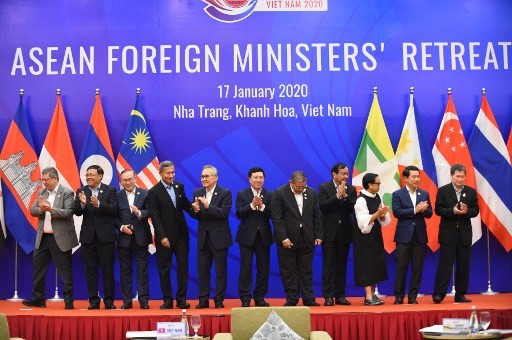Popular Reads
Top Results
Can't find what you're looking for?
View all search resultsPopular Reads
Top Results
Can't find what you're looking for?
View all search resultsOnline trade solution program for ASEAN businesses sees few takers
In support of the ASEAN regional integration, the EU has helped establish the trade solution platform, dubbed the ASEAN Solutions for Investments, Services and Trade (ASSIST), through its ASEAN Regional Integration Support by the EU (ARISE) Plus technical facility.
Change text size
Gift Premium Articles
to Anyone
 Foreign ministers of the Association of Southeast Asian Nations (ASEAN) from left to right: Malaysia's Saifuddin Abdullah, Myanmar's Union Minister for International Cooperation Kyaw Tin, Philippines' Teodoro Locsin, Singapore's Vivian Balakrishnan, Thailand's Don Pramudwinai, Vietnam's Pham Binh Minh, Brunei's Ministry of Foreign Affairs Erywan bin Mohd Yusof, Cambodia's Prak Sokhonn, Indonesia's Retno Marsudi, Laos' Saleumxay Kommasith and ASEAN Secretary-General Lim Jock Hoi pose for a group photo during the ASEAN Foreign Ministers' Retreat in Nha Trang on Jan. 17. (AFP/Nhac Nguyen)
Foreign ministers of the Association of Southeast Asian Nations (ASEAN) from left to right: Malaysia's Saifuddin Abdullah, Myanmar's Union Minister for International Cooperation Kyaw Tin, Philippines' Teodoro Locsin, Singapore's Vivian Balakrishnan, Thailand's Don Pramudwinai, Vietnam's Pham Binh Minh, Brunei's Ministry of Foreign Affairs Erywan bin Mohd Yusof, Cambodia's Prak Sokhonn, Indonesia's Retno Marsudi, Laos' Saleumxay Kommasith and ASEAN Secretary-General Lim Jock Hoi pose for a group photo during the ASEAN Foreign Ministers' Retreat in Nha Trang on Jan. 17. (AFP/Nhac Nguyen)
A
n online platform to help business players resolve cross-border trade issues in the Southeast Asia region has been met with a cold shoulder by the region’s economic community, a European Union (EU)-backed facility has shown.
In support of the ASEAN regional integration, the EU has helped establish the trade solution platform, dubbed the ASEAN Solutions for Investments, Services and Trade (ASSIST), through its ASEAN Regional Integration Support by the EU (ARISE) Plus technical facility.
Paolo Vergano, a trade facilitation expert at ARISE Plus, said the platform only saw 10 cases lodged so far, with five out of the six cases lodged in 2019 being from business councils or business federations.
“ASEAN businesses are not using ASSIST,” Vergano said during a livestreamed outreach event on July 30, as he urged the region’s businesses to utilize the platform.
ASSIST is expected to help ASEAN-based enterprises expedite complaint-filing with other ASEAN governments over cross-border trade issues, including non-tariff measures.
The increasingly integrated ASEAN economy follows the introduction of the ASEAN Economic Community (AEC) in 2015. As of 2018, ASEAN was the fifth-largest economy in the world with a total combined gross domestic product (GDP) of US$3 trillion.
ASEAN economic integration continued to contribute to the region’s emerging position as a global growth driver, with intra-ASEAN activity accounting for the largest share of ASEAN’s total trade and its foreign investment in 2018, standing at 23 percent and 15.9 percent, respectively, according to the 2019 ASEAN Integration Report.
“In the European Union, a similar [trade solution platform] system known as SOLVIT has seen over 10,000 cases compared with 10 cases in ASEAN,” Vergano said.
The EU’s SOLVIT is described by the European Commission as “an informal problem-solving network that can help EU citizens or businesses when their rights are breached by public authorities in another EU member state”.
In 2019, SOLVIT reported having handled a total of 2,380 cases that fell within its remit, while also receiving an additional 2,977 complaints that were not within its remit.
“The concept is trying to minimize long tariff barriers and measures and to have the private sector talk to the government within a system that is free of charge and fully based on the internet,” Vergano said.
He added that the platform provided businesses with an anonymity feature in case they were concerned about possible retaliation as a result of filing their complaints.
Businesses can expect to have practical solutions within 40 to 60 days upon having their complaint accepted by the central administrator of the ASSIST website. Once a solution is proposed, they can either accept the proposed solution or reject it and look for other channels to resolve their dispute.
Vergano noted, however, that the platform was not a silver bullet that could overcome complicated problems such as government inefficiencies or red tape. It is meant to address a specific problem, he said, but it could help build momentum for change.
“If we can establish a pattern of 50, 100 requests to the government, with no solution provided, that government will look terrible and there will be further pressure by other ASEAN member states on that government to actually start providing a solution,” Vergano argued.
Robert Kwee, the founder of Alfamart Trading Philippines, said during the webinar that there were no specific regulations that served as an obstacle to trading in ASEAN.
“But in reality, many players do not open market opportunities," he said.
Trade attache at the Indonesian embassy in Manila, Lazuardi Nasution, cited on July 30 a case where foreign architects working in the Philippines must take a professional exam.
The examination, however, was conducted in Filipino, making it harder for Indonesians to work as architects in the Philippines, Lazuardi noted.









